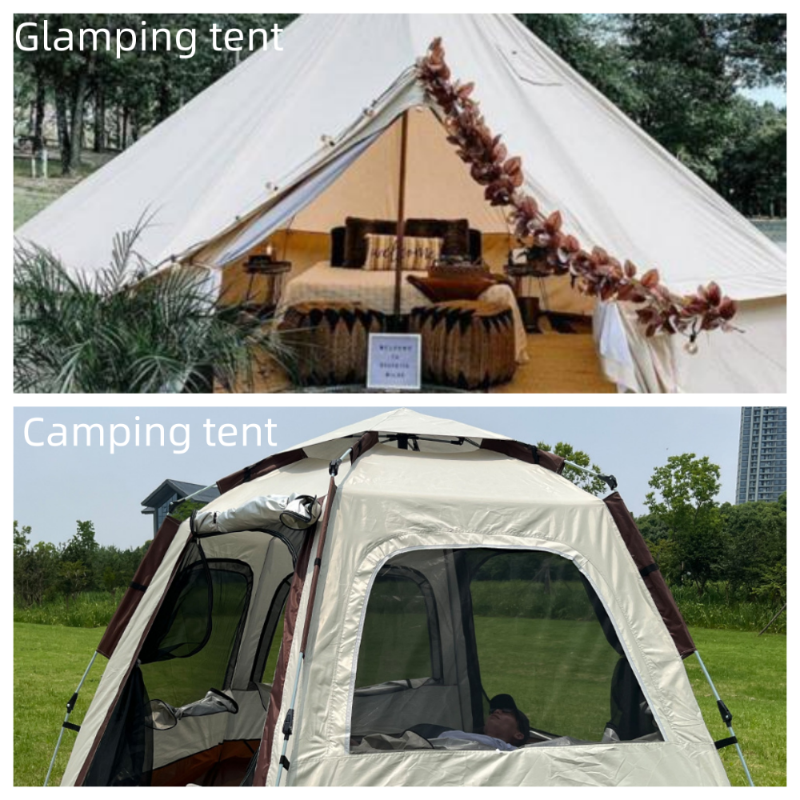What Are the Benefits of Glamping vs. Camping?
Spending time in nature offers numerous benefits, from reducing stress to enhancing overall well-being. When planning an outdoor getaway, individuals often choose between two popular options: glamping (glamorous camping) and traditional camping. While both allow people to enjoy the beauty of the outdoors, they differ significantly in comfort, convenience, and experience. This article explores the advantages of each to help determine which option best suits different travelers' needs.

1. Comfort and Accommodation
One of the biggest distinctions between glamping and camping is the level of comfort offered.
- Glamping: Provides high-end accommodations such as safari tents, geodesic domes, treehouses, yurts, and luxury cabins. These often include real beds with plush mattresses, heating or air conditioning, indoor lighting, and private restrooms. Some even offer stylish décor and hot tubs.
- Camping: Involves setting up a traditional tent or hammock and sleeping in a sleeping bag or on a sleeping pad. Comfort depends on the quality of gear, but campers must adapt to more rugged conditions, often sleeping on uneven ground and relying on natural ventilation.
Advantages of Glamping:
Glamping provides a home-like experience with hotel-style comfort, making it an ideal choice for those who want to experience nature without sacrificing modern conveniences.
2. Convenience and Accessibility
Glamping and camping differ significantly in terms of the effort required to set up and maintain the experience.
- Glamping: Sites are typically pre-assembled, eliminating the need to pitch a tent, build a fire, or cook over a portable stove. Many locations offer on-site restaurants, concierge services, and guided activities, reducing the planning and preparation needed.
- Camping: Requires preparation, including bringing all necessary gear, setting up the tent, gathering firewood, cooking meals, and handling unpredictable weather conditions. Campers must also pack and transport all their supplies to the site.
Advantages of Glamping:
Glamping eliminates much of the hassle associated with camping, making it perfect for beginners, families with young children, or those looking for a stress-free outdoor retreat.
3. Immersive Nature Experience
While both options provide access to natural surroundings, the way travelers interact with nature differs.
- Glamping: While still providing proximity to nature, glamping sites are often more structured, with designated pathways, electricity, and temperature-controlled environments. This reduces exposure to harsh weather or wildlife.
- Camping: Allows for a fully immersive outdoor experience, where individuals sleep directly in nature, hear the sounds of the wilderness at night, and rely on their outdoor skills to navigate and adapt.
Advantages of Camping:
Camping provides a deeper connection to nature, helping individuals develop survival skills, independence, and appreciation for the natural world.
4. Amenities and Facilities
The availability of facilities and services is another major difference between glamping and camping.
- Glamping: Offers amenities such as full kitchens, hot showers, Wi-Fi, power outlets, and even spa services. Some locations also provide entertainment options like movie nights, guided tours, and outdoor dining experiences.
- Camping: Often limited to public restrooms (or none at all), requiring campers to bring their own gear for cooking, cleaning, and shelter. There may be no electricity, running water, or phone service.
Advantages of Glamping:
Glamping ensures a more comfortable and convenient stay, making it suitable for those who prefer modern conveniences while still enjoying an outdoor setting.
5. Cost and Budget Considerations
Affordability can be a deciding factor when choosing between glamping and camping.
- Glamping: Typically more expensive due to high-end accommodations, services, and amenities. Prices can range from a few hundred to several thousand dollars per night, similar to luxury resorts.
- Camping: A cost-effective alternative, requiring only basic gear such as a tent, sleeping bag, and camping stove. Many campsites have low fees or are free to use, making camping more budget-friendly.
Advantages of Camping:
Camping is the more economical choice, making outdoor adventures accessible to a wider audience.
6. Suitability for Different Travelers
Different types of travelers may prefer glamping or camping depending on their needs and expectations.
-
Glamping is ideal for:
- Families with young children who require added comfort and security.
- Couples looking for a romantic getaway in nature.
- First-time campers who want an introduction to outdoor living without the challenges of traditional camping.
- Business professionals or groups seeking a retreat with both relaxation and adventure.
-
Camping is best for:
- Outdoor enthusiasts and adventure seekers who enjoy self-sufficiency.
- Budget-conscious travelers who want an affordable outdoor experience.
- Backpackers or hikers who need lightweight and portable accommodations.
- Individuals looking for solitude and a closer connection to nature.
Final Verdict: Which One is Right for You?
Both glamping and camping offer unique outdoor experiences, and the choice ultimately depends on individual preferences:
- Choose glamping if you prefer comfort, convenience, and luxury amenities. It is ideal for those who enjoy nature but want a stress-free and indulgent stay.
- Opt for camping if you seek adventure, self-sufficiency, and a closer connection to nature. It is perfect for those who enjoy the challenge of living outdoors.
Regardless of the choice, both options provide a fantastic way to escape daily routines, explore the outdoors, and create memorable experiences. Whether seeking relaxation or adventure, glamping, and camping each have their unique appeal.
